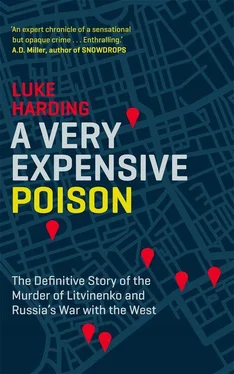Shvets claims that Ivanov personally lost $10–15 million in kickbacks after the western company which commissioned the report read it with horror and pulled out of a major deal with Russia. The name of the company has not been revealed. Amongst his other business interests and his KGB role, Ivanov is chairman of Aeroflot, the Russian state carrier. (He denies wrongdoing.)
When Lugovoi flew back to Moscow, the FSB detained him at the airport. According to Shvets, they found Litvinenko’s report. By accident or design? We don’t know. Was this the moment that Lugovoi was recruited by the FSB, forced to do their dirty work in order to avoid punishment for his role in handling the report? Or – more likely, perhaps – was Lugovoi working for the FSB from the start and this was therefore a deliberate betrayal?
Either way, the contents of the report were passed back to the Kremlin. The nature of any subsequent conversation between Ivanov and Putin is unknown. But, weeks later, Lugovoi was on his way back to London with his partner Kovtun, this time in the role of assassin – on a mission to kill the author.
* * *
The origins of Litvinenko’s own bitter personal feud with Putin go back to the 1990s, and to Litvinenko’s career as an FSB officer. Those who knew him characterise Litvinenko as mercurial, dedicated and obsessive when on a case – a good sleuth or operativnik in an organisation riddled with wrong-doing.
Litvinenko had plenty of antecedents. Think Arkady Renko, the honest Soviet policeman who features in Martin Cruz Smith’s Gorky Park. Litvinenko’s friend Alex Goldfarb would liken him to the eponymous hero of Serpico , the 1973 movie starring Al Pacino, in which a decent cop goes undercover to expose corruption inside his own force. Others would bend the rules, cheat, lie. Litvinenko refused. He would stick to the truth and the law.
Another friend and fellow exile, Viktor Suvorov, likened Litvinenko to a different literary character, from Alexandre Dumas’s classic novel The Three Musketeers. Like everyone who knew him, Suvorov referred to Litvinenko as Sasha. ‘Sasha was pure D’Artagnan,’ Suvorov said. ‘He was tall, handsome, sporty and open.’ He added: ‘He met so many real criminals. He understood really bad people, how bad they were. And yet he was very optimistic. He still believed in humankind.’
Litvinenko was born on 12 December 1962 in the Russian city of Voronezh. He had something of a fractured childhood. His parents, Walter and Svetlana, divorced when he was a baby; he grew up with his grandparents in the city of Nalchik, in Russia’s wild north Caucasus, close to the mountains. In between he had stints living with his mother in Moscow and an aunt in a town called Morozovsk. He went to secondary school in Nalchik.
His grandfather fought in the Great Patriotic War, as Russians call the Second World War. A month before he was due to be called up for national service at the age of seventeen, Litvinenko enlisted in the army. Between 1981 and 1985 he attended a Soviet military academy in Ordzhonikidze, now called Vladikavkaz. Vladikavkaz, in north Ossetia, is Russia’s gateway to the Caucasus: a place of rugged beauty, hillside fortresses and heavy skies prone to mist and rain.
In 1988, Litvinenko got transferred to a special division of the ministry of internal affairs. Here, in Moscow, the KGB hired him. Litvinenko began work in military counter-intelligence. In 1991, he joined the department that combated organised crime, corruption and terrorism. With the end of the Soviet Union in December 1991 the KGB ceased to exist and Litvinenko’s unit became part of the new FSK. In 1993 the FSK was renamed the FSB.
When still at military school and aged just twenty, Litvinenko married Natalia. He became the father of two small children, Sonya and Alexander. The relationship failed and by 1993 the couple were estranged. That summer – on 16 June – Litvinenko met his future second wife Marina, a ballroom dancing teacher. She had been married before too. It was her birthday party.
Marina was slim and attractive, with short blonde hair, boyishly cut, high cheekbones and clear blue eyes. She cut a gamine figure; her clothes smart and understated verging on conservative; earrings a single stud. I got to know her much later. What makes Marina extraordinary is her warm personality. She is someone of high emotional intelligence: concerned for others, friendly, affectionate, tactile. And – this came later too – courageous.
Before the party, two of Marina’s close friends had been receiving threats from some former business partners over a ballroom dancing trip to Sri Lanka that had gone wrong. Frightened, the couple went to a police station. There they met Litvinenko – a senior FSB officer – who took the unusual step of offering them his personal protection. Marina’s friends were impressed. Litvinenko struck them as professional and calm. They brought him along to Marina’s birthday celebration.
Litvinenko was meant to be on holiday but he worked on the case flat-out. This was characteristic: once gripped by an assignment Litvinenko would often not sleep for three days. After rows with Natalia he moved out and lodged with his mother. That autumn he and Marina began living together. In summer 1994 they had a son, Anatoly; they married a few months later. It would be a happy partnership.
Three months later, in December 1994, Boris Yeltsin launched an attack on the rebel republic of Chechnya, in what was to become the First Chechen War. The goal was to wipe out Chechnya’s bid for independence. The Kremlin anticipated quick, decisive victory. Instead, the invasion turned into a bloody disaster for Moscow, with the Russian tank force sent on New Year’s Eve to re-take Chechnya’s capital Grozny destroyed and the army humiliated.
Litvinenko had grown up in the Caucasus; he understood the mentality of southern Russia’s majority Muslim population. In 1995, the FSB sent him back to Nalchik, to offer communications support to the forces fighting close by. At first Litvinenko supported Yeltsin’s war. Gradually, however, he grew disillusioned – with the Russian army’s brutal methods and with the president’s political goals, seemingly driven by imperial pique.
In January 1996, the Chechen guerrilla leader Salman Raduyev raided the town of Kizlyar in Dagestan, near the Chechen border. His fighters seized the local hospital. They took 3,000 people hostage. After negotiations, Raduyev was allowed to return to Chechnya, with his fighters and 160 hostages. His convoy got as far as the last village before the border, Pervomaiskoye. A Russian helicopter gunship opened fire on the lead bus; the Chechens took cover in nearby cottages.
Litvinenko was sent with his FSB team into what was to become a hellish siege. Russian forces surrounded the village for five days – then bombarded it with tank fire and Grad missiles. On the ninth day of the crisis, the surviving rebels with their hostages broke out of the encirclement at night, fleeing across a field under heavy mortar and machine-gun fire. At least twenty-nine civilians and 200 combatants from both sides perished.
According to Marina, the slaughter had a profound affect on Litvinenko. The themes were familiar: the Russian state’s indifference to civilian casualties, and the incompetence of its military command. He returned to Moscow in poor shape. ‘He looked very bad, his hands and feet were frozen, and he needed a week to recover,’ Marina said. His sympathy for Chechens and their struggle against the centre grew; it would later become a journalistic obsession and a future area of conflict with Putin.
During this same period, Litvinenko met and became friendly with a man named Boris Berezovsky. Berezovsky was a mathematician and academic who had gone into business as the Soviet Union collapsed. Like a determined object pushing at a tough membrane, he had penetrated Boris Yeltsin’s inner circle. He published the president’s memoirs and became friends with Yeltsin’s influential daughter Tatyana Yumasheva.
Читать дальше












